- Home
- David Lubar
Lay-ups and Long Shots
Lay-ups and Long Shots Read online
An anthology of short stories by
Joseph Bruchac
Lynea Bowdish
David Lubar
Terry Trueman
CS Perryess
Dorian Cirrone
Jamie McEwan
Max Elliot Anderson
Peggy Duffy
Text copyright for “SWISH: A Basketball Story” © 2008 by Joseph Bruchac
Text copyright for “Fat Girls Can’t Run” © 2008 by Lynea Bowdish
Text copyright for “Bounce-Back” © 2008 by David Lubar
Text copyright for “H-O-R-S-E” © 2008 by Terry Trueman
Text copyright for “Amazing Dirt Girl Rides Again” © 2008 by CS Perryess
Text copyright for “Riding the Wave” © 2008 by Dorian Cirrone
Text copyright for “Red Shorts, White Water” © 2008 by Jamie McEwan
Text copyright for “Big Foot” © 2008 by Max Elliot Anderson
Text copyright for “Song of Hope” © 2008 by Peggy Duffy
All rights reserved. International copyright secured. No part of this book may be reproduced, stored in a retrieval system, or transmitted in any form or by any means—electronic, mechanical, photocopying, recording, or otherwise—without the prior written permission of Lerner Publishing Group, Inc., except for the inclusion of brief quotations in an acknowledged review.
Darby Creek
A division of Lerner Publishing Group, Inc.
241 First Avenue North
Minneapolis, MN 55401 U.S.A.
Website address: www.lernerbooks.com
Cataloging-in-Publication
Lay-ups and long shots : an anthology of short stories / by Joseph Bruchac ... [et al.].
p. ; cm.
ISBN 978-1-58196-078-5
Ages 10 and up.—Summary: A collection of nine short stories about middle-schoolers and sports. They range from basketball, to running, Ping-Pong, dirt biking, surfing, kayaking, place kicking, soccer, and. a game of “H-O-R-S-E”
1. Sports—Juvenile fiction. 2. Athletic ability—Juvenile fiction. 3. Sportsmanship—Juvenile fiction. [1. Sports—Fiction. 2. Athletic ability—Fiction. 3. Sportsmanship—Fiction.] I. Title. II. Author.
PS648.S78 L39 2008
813/.0108357 dc22
OCLC: 209781485
Manufactured in the United States of America
3 — B P — 9/1/1 0
eISBN: 978-0-7613-8273-7 (pdf)
eISBN: 978-1-4677-3218-5 (ePub)
eISBN: 978-1-4677-3219-2 (mobi)
CONTENTS
SWISH: A Basketball Story
Joseph Bruchac
Fat Girls Can’t/Don’t Run
Lynea Bowdish
Bounce-Back
David Lubar
H-O-R-S-E
Terry Trueman
Amazing Dirt Girl Rides Again
CS Perryess
Riding the Wave
Dorian Cirrone
Red Shorts, White Water
Jamie McEwan
Big Foot
Max Elliot Anderson
Song of Hope
Peggy Duffy
Joseph Bruchac
Joseph Bruchac is a prolific writer and storyteller whose work often reflects his Abenaki Indian heritage and his rural upbringing in the Adirondack mountain foothills. Most of his childhood, he was always the kid picked last or left out when it came to sports—until he grew six inches between his junior and senior years in high school and went on to play football, become a champion heavyweight wrestler, and throw the shotput and discus in track. His books about sports include Native American Games and Stories (coauthored with his son, James), The Warriors, and The Way.
SWISH:
A Basketball Story
by
Joseph Bruchac
“What’s the difference between a fourth string basketball player and a masochist?”
It was my second day of trying to become a high school basketball player. Thus it was my responsibility to reply to that question asked by Kelly Donahue, the team captain and leading scorer. And just in case I didn’t realize that was my role, I got elbowed in the ribs by him as he asked it.
“I don’t know,” I sighed. “What?”
“A masochist knows when to stop punishing himself.”
If there’s one joke to sum up my attempted career in basketball, I guess that’s it. Even suggesting I might be a fourth stringer was a compliment.
I’d practiced some at home next to the general store and gas station where I lived with my grandparents. I’d gotten a new basketball from them for Christmas. As soon as the snow cleared, Grampa Jesse had nailed up a bent basketball hoop with a torn net to the shingled side of the building as close to regulation height as the low roof allowed. There we played intermittant games of HORSE through the summer and fall—broken up by the arrival of customers when Grampa would stow the ball behind the door while he pumped gas. Since we lived way out in the country, there usually weren’t other kids of my age to play with. But even though I usually won against my seventy-year-old grandfather, I couldn’t seem to improve.
Maybe it was also due to the peculiarity of that makeshift basketball court that had been set up for me. Their store on the corner of Route 9N and Middle Grove Road was called the Splinterville Hill Filling Station for good reason. It was halfway up a steep hill once paved with splintery planks. Our driveway, on the Middle Grove Road side of the store, had an outside slant toward 9N, the busy state road that my nervous grandmother always urged me away from. (Though I was fourteen I still wasn’t allowed to ride my bike there.) On 9N, a steady stream of cars and big trucks rumbled by. Even going uphill they traveled at a rapid clip because, as my grandmother put it, they had to “get up a head of steam” to make it to the top.
I wasn’t allowed to play alone. Grampa had to be there to make sure the ball didn’t get away from me and go bouncing into traffic. The surface of my so-called ball court was only half paved, the old blacktop rippled with frost. A bounce might come back to your hand or careen off toward parts unknown. All I could realistically practice was shooting from ten or twenty feet out. No dribbling or passing or even lay-ups. However, I’d developed a few special shots in our HORSE contests, where you had to match the shot of the person ahead of you or earn a letter, with the first person getting all five being the loser. For example, I could sometimes make a tricky basket by throwing the ball down so hard on a certain flat piece of blacktop that it would bounce up high and go in. Not something you could do in a real game.
By my second day of trying out for the team I’d discovered that there were only three things I’d excelled at during practice. The first was traveling.The second was double-dribbling. And if you don’t know what those two no-nos are, then you know less about the game than I did when I was an undersized teenager at Saratoga High School.
And what was the third thing? I had a natural ability for fouling. Small as I was, when I went for the ball, I was almost always able to get it—along with a loud blast from the whistle because I’d knocked somebody down or accidentally popped somebody in the nose with my elbow and slapped their hands taking the ball away. To make matters worse, my first reaction whenever that happened was to complain.
“I didn’t foul. I know I didn’t. Maybe somebody else tripped you. I didn’t do that, did I? I’m sure I just hit the ball and not your arm. Honest.”
Coach Dalrymple called me over to him. “Bruchac,” he said, “what are you, a basketball player or bowling ball? No, I don’t want you to answer that. Just take a seat.”
Why did I want to play a game for which I had no natural ability? I guess there’s only one word to explain it. Swish! That’s the sound a ball makes when you shoot it from ten or t
wenty or even thirty feet away and it arcs up—a hook or a two-handed foul shot or a one handed fall-away jumper, it doesn’t matter—and falls right through without touching the rim. Swish! The sweet sound it makes as it ripples through the net.
I’d done that. Swished the ball. It was almost always when I was alone in the gym or shooting with Grampa at the old nailed-up hoop. And I only managed it about one shot out of a hundred. Never twice in a row. But when it happened, it was like an electrical current shot through me from the top of my head on down to my toes. Swish! Pure magic. My fondest hopes in basketball were first to hear that swish, and second to play a real basketball game on a real court with Grampa watching and telling people proudly, “That’s my grandson.” Making him proud of me was as important as anything.
So I tried to stick with it, even though on the second day after practice when I came back to my locker I found my shoes with no laces and my street clothes tied together in knots. And on the third day, I got tripped by somebody—it might have been Pat Harley, who I’d accidentally elbowed in the nose—so that I ended up falling over a bench, cracking the left lens of my glasses and skinning my knee. I don’t think the other players meant to be cruel. I was just the obvious target for the instinctive response of adolescent jocks confronted by absolute incompetence in their chosen field. You couldn’t criticize them for their behavior any more than you’d fault a pride of lions for pulling down a wounded wildebeest.
Being hopelessly inept at such small details as passing, catching the ball, dribbling, and shooting also got me noticed by the coaches. Not only was I creating havoc whenever I was allowed on the floor, they saw something that I didn’t. If I kept on bumping into, tripping, and elbowing the other players—even in drills—the next time I ventured into the locker room after practice with eighteen larger, resentful fellow players, I might not come out alive.
Partway through my fourth day, Coach Dalyrymple walked out on the court, took the ball from my hand, and tossed it to another player. He put one arm around my shoulder and led me over to the stands by the back door to the gym.
“Bruchac,” he said in a soft voice, “I know your grandparents. I know you’re a good kid. But this game’s not for you. Maybe next year if you get six inches taller. Hit the showers.”
“But practice isn’t over yet,” I protested.
“It’s over for you, son,” Coach Dalyrymple squeezed my shoulder as I lifted one hand to push my glasses—which now had two cracked lenses—back up my nose. He spoke slowly, to make sure I understood. And though the tone of his voice was kind, those words hurt. “You are not going to be on the basketball team. Go home.”
When I got off the late bus that afternoon, my grandparents weren’t home. The store was locked and there was a note from Grama on the house door. Doc Magovern had come to the house because Grampa was “having trouble with his blood.” Now they were off to the hospital and I “wasn’t to worry.” This had happened before. Grampa had pernicious anemia and sometimes was very sick. So, naturally, it worried the pants off me. I actually thought about taking my bike down the dreaded 9N the three miles to the Saratoga Hospital. Instead, I did as I knew they wanted. I opened the store and waited for customers. None came, though, and my eye was caught by the basketball stowed away as usual behind the door. I had to do something to take my mind off what was happening to Grampa. I took out the ball and went around the side.
When I started, I wasn’t thinking about playing a game. My one thought was “If I make this one, Grampa is going to come home.” Then I hit a two-handed shot from the foul line we’d scratched on the cracked black top. Not only that, for once the ball actually bounced straight back to me.
“If I make two in a row,” I whispered to myself, “Grampa is going to live for . . . two more years.” Then I took four steps back and put up an awkward left-hand hook. It hit the side of the building, scraped off the rough shingles, rattled around the rim and fell through. Two in a row! I took a deep breath. My heart was in my throat as my fingertips stroked the rough texture of the orange ball’s surface. Some superstitious part of me felt as if I was holding my grandfather’s life in my hands.
“If I make this one,” I said out loud, “Grampa is going to live for another ten years.” Then I tried my special trick shot. I threw the ball down as hard as I could onto that flat piece of pavement. It thwanged off the blacktop as if it was alive, so high that it was actually above the roof of the store. It flew in a rainbow arc, down, down, Swish! Straight through without touching the rim.
I raised both my fists up in the air. “Yes!” I shouted.
It would’ve been better if I’d kept my hands down. The ball richocheted off the rough surface and flew past me so fast that all I could do was hit it with my knee as I tried in vain to grab it before it reached the slanted part of the drive way.
Thwonk! Thwonk! It was picking up speed, the distance between bounces getting bigger while I watched with my mouth open. Thwonk! One huge final bounce as it soared into the uphill lane of 9N.
Whomp! I felt as much as heard the impact between the ball and the Eggleston Transport truck speeding north toward Corinth. The ball didn’t bounce off, but lodged in the wide grill. And the driver of the big rig, who probably never even saw it, just kept going—taking my basketball and my wish with him.
And all I could do was smile.
Three hours later, Grampa and Grama pulled into the driveway in their old blue Plymouth with Grampa Jesse behind the wheel. He looked a little tired, but wasn’t so pale now that they’d given him a transfusion. They both hugged me and thanked me for being so responsible and taking care of the store.
“We got time for a game a HORSE before supper,” Grampa said. “It’s getting dusk, but I could turn on the side lights.”
I shook my head. “Let’s just watch Gunsmoke,” I said.
Somehow, my grandparents never noticed that the basketball was gone. And I didn’t mind. The way I’d lost that ball had been like a sacrifice, a transaction in which I gave up a childish dream in exchange for something more important. I felt—satisfied.
I did get my growth—enough of it so that I stood 6'2" tall my senior year in high school. However, my grandfather never saw me play basketball on a team. No, it wasn’t because my wish for his survival failed. Instead, I’d discovered a sport I truly was good at, its season the same time as basketball—wrestling. My senior year in high school I was the varsity heavyweight and actually won the Regional Tournament while my grinning grandfather watched in the stands, telling everyone within earshot, “That’s my grandson.”
Lynea Bowdish
Lynea Bowdish grew up in Brooklyn, New York, where the most common sports were stick ball (played in the street), and stoop ball (played against the front stoop). No one seemed to mind not having uniforms, or teams, or regularly scheduled games with parents on the sidelines. The game started when someone came outside with a ball. It ended when most of the kids had been called home to dinner.
That doesn’t mean Lynea doesn’t like organized sports. She loves swimming and enjoys watching hockey (except for the fighting). Having grown up as one of the “large” kids, she also firmly believes that bird watching and computer games should qualify as sports when it comes to school fitness tests.
Lynea now lives in Maryland with her husband, David Roberts, and their two dogs, Zephyr and Cody.
Fat Girls Can’t/Don’t Run
by
Lynea Bowdish
You’re not supposed to call people “fat” anymore. Instead, you’re supposed to use words like “large,” and “big.” As in, “wow, does she look large in those jeans.” Or “no one will ever date a girl that big.”
You’re not supposed to make fun of them, either. The Tonight Show’s Jay Leno doesn’t know that. Neither does the sixth grade class of Brookhaven Middle School. They both make fun of fat people.
I’m “large.” I’m also in sixth grade at Brookhaven Middle. Those two things don’t go together.
“You’re not really fat,” Beverly says. “You’ll grow out of it.”
Beverly is my best friend, and when she says it, I almost believe her. Everyone believes Beverly. Even Ms. Sanchez, the gym teacher.
“I have a headache,” Beverly tells Ms. Sanchez.
And because Beverly doesn’t lie, she gets an excused absence.
When you’re fat, everyone thinks you’re making up excuses. And I do. So far this year I’ve tried a stomachache, blurry vision, a sick dog at home (his name is Henry), and a cold.
Nothing.
I really do try in gym. I grab the climbing rope and pull, but no matter how much Ms. Sanchez yells “Climb, Carla, climb,” I can’t.
That’s me. Carla Anders.
I can’t climb, and I can’t sink a basketball. And I can’t turn somersaults. My neck wasn’t made to bend under my body. Not unless it were severely broken.
I’m not the only fat girl in sixth grade. But it’s a question of degree.
Some are just slightly rounded, like Emily. But she’s rounded in all the important places.
Some are thick and hard. They can pick up a desk with one hand, and would beat up anyone who called them fat.
And then there’s Glenda and me.
Glenda and I don’t talk, of course. That’s one of the rules for being fat.
Fat kids don’t talk to each other. Some of their weight might rub off on you and make you more noticeable. And the point is to stay as invisible as possible.
Which is why gym is so bad. It’s impossible to be invisible in gym. Especially when you’re trying to climb into gym shorts in the locker room.
No, I don’t diet. When I was ten I tried a diet and gained five pounds. I gave up dieting forever.
And I don’t exercise. The closest I get to exercise is Henry. I walk Henry every day after school. I love that dog. He’s nine years old, and big and hairy, and he plods along and sniffs everything.

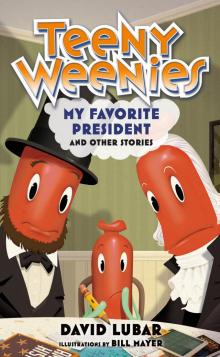 Teeny Weenies: My Favorite President
Teeny Weenies: My Favorite President Teeny Weenies: The Intergalactic Petting Zoo
Teeny Weenies: The Intergalactic Petting Zoo Teeny Weenies: The Eighth Octopus
Teeny Weenies: The Eighth Octopus Emperor of the Universe
Emperor of the Universe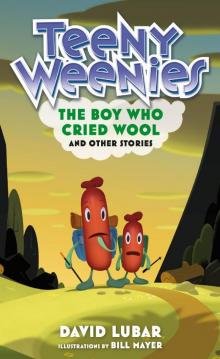 Teeny Weenies: The Boy Who Cried Wool
Teeny Weenies: The Boy Who Cried Wool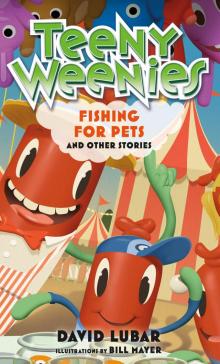 Teeny Weenies: Fishing for Pets
Teeny Weenies: Fishing for Pets Teeny Weenies: Freestyle Frenzy
Teeny Weenies: Freestyle Frenzy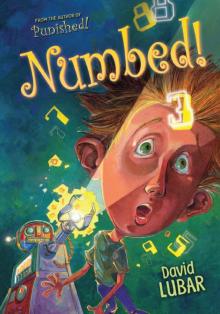 Numbed!
Numbed!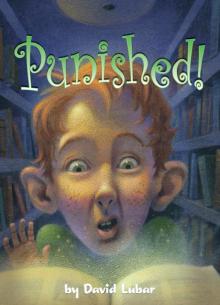 Punished!
Punished!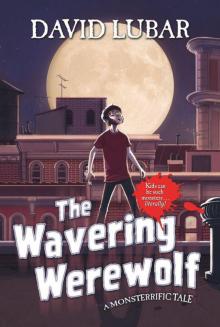 The Wavering Werewolf: A Monsterrific Tale (Monsterrific Tales)
The Wavering Werewolf: A Monsterrific Tale (Monsterrific Tales)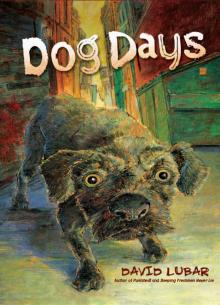 Dog Days
Dog Days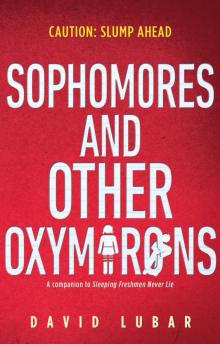 Sophomores and Other Oxymorons
Sophomores and Other Oxymorons The Psychozone
The Psychozone My Rotten Life
My Rotten Life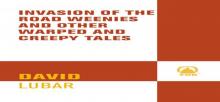 Invasion of the Road Weenies
Invasion of the Road Weenies In the Land of the Lawn Weenies
In the Land of the Lawn Weenies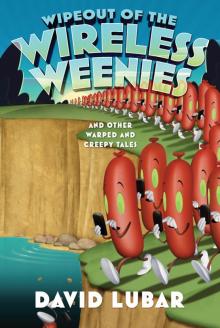 Wipeout of the Wireless Weenies
Wipeout of the Wireless Weenies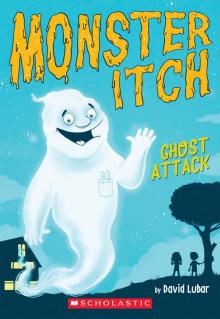 Ghost Attack
Ghost Attack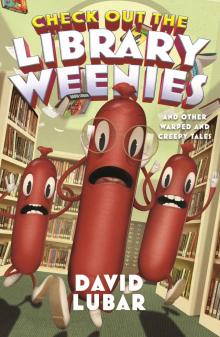 Check Out the Library Weenies
Check Out the Library Weenies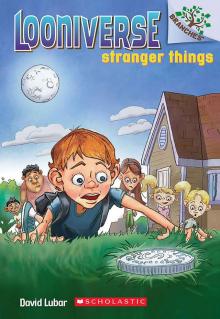 Looniverse #1: Stranger Things (A Branches Book)
Looniverse #1: Stranger Things (A Branches Book)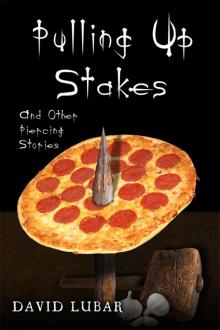 Pulling up Stakes and Other Piercing Stories
Pulling up Stakes and Other Piercing Stories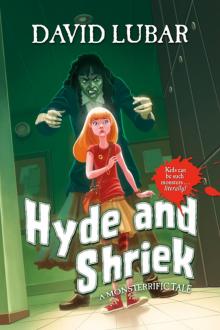 Hyde and Shriek
Hyde and Shriek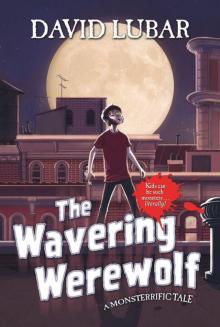 The Wavering Werewolf
The Wavering Werewolf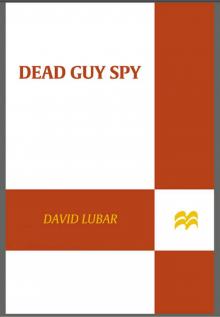 Dead Guy Spy
Dead Guy Spy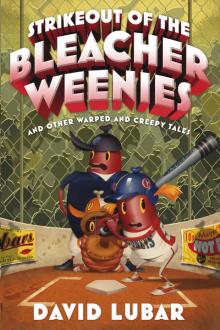 Strikeout of the Bleacher Weenies
Strikeout of the Bleacher Weenies The Big Stink
The Big Stink The Battle of the Red Hot Pepper Weenies
The Battle of the Red Hot Pepper Weenies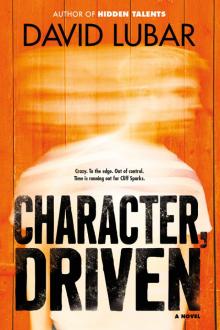 Character, Driven
Character, Driven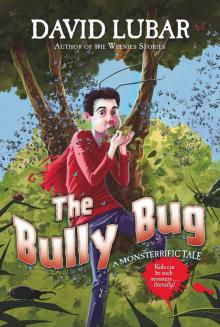 The Bully Bug
The Bully Bug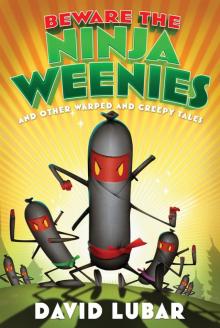 Beware the Ninja Weenies
Beware the Ninja Weenies Extremities: Stories of Death, Murder, and Revenge
Extremities: Stories of Death, Murder, and Revenge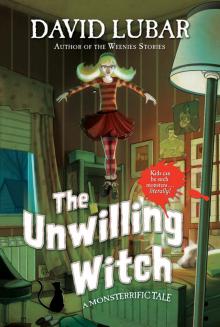 The Unwilling Witch
The Unwilling Witch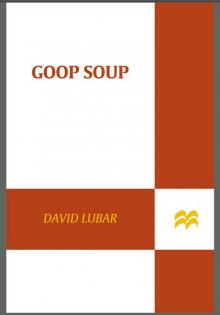 Goop Soup
Goop Soup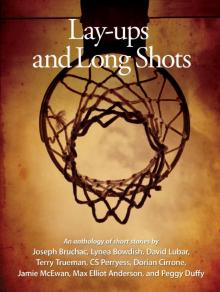 Lay-ups and Long Shots
Lay-ups and Long Shots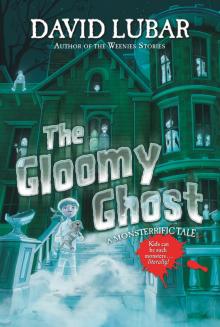 The Gloomy Ghost
The Gloomy Ghost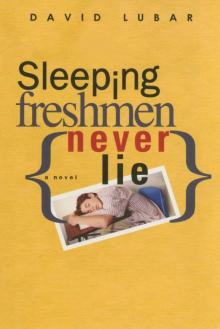 Sleeping Freshmen Never Lie
Sleeping Freshmen Never Lie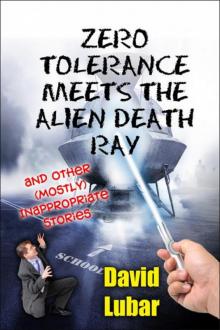 Zero Tolerance Meets the Alien Death Ray and Other (Mostly) Inappropriate Stories
Zero Tolerance Meets the Alien Death Ray and Other (Mostly) Inappropriate Stories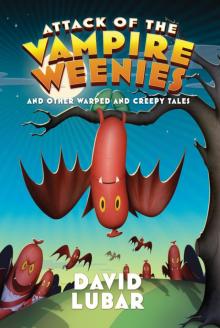 Attack of the Vampire Weenies
Attack of the Vampire Weenies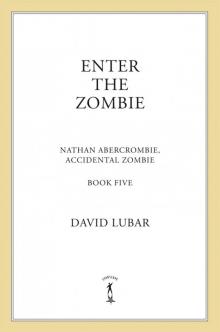 Enter the Zombie
Enter the Zombie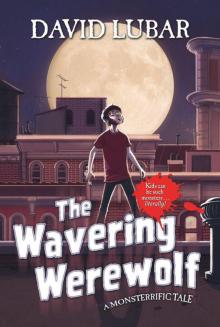 The Wavering Werewolf_A Monsterrific Tale
The Wavering Werewolf_A Monsterrific Tale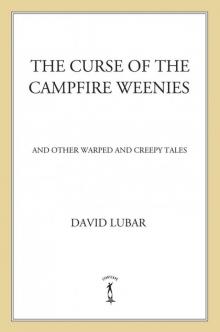 The Curse of the Campfire Weenies
The Curse of the Campfire Weenies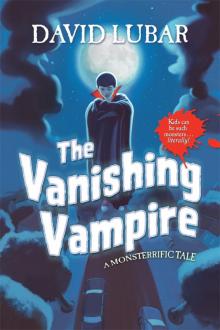 The Vanishing Vampire
The Vanishing Vampire